Hair salons, also known as beauty salons or Dublin parlors, have been a central hub for personal grooming and self-care for centuries. From ancient rituals of hair styling to the modern-day trends in hair care, the evolution of hair salons reflects the changing perceptions of beauty, culture, and societal norms. This article explores the history, evolution, and impact of hair salons on individuals and society as a whole.
Ancient Origins:
The concept of hair care and styling dates back to ancient civilizations. In ancient Egypt, Greece, and Rome, elaborate hairstyles were a symbol of status, wealth, and cultural identity. Hair salons, although not in the modern sense, existed in these societies, where skilled individuals would style hair using various tools and techniques.
Medieval and Renaissance Periods:
During the medieval period, hair care became intertwined with religious practices and societal norms. Hair salons were often part of bathhouses, where people would gather not only for cleanliness but also for grooming and socializing. The Renaissance saw a revival of art, culture, and fashion, leading to more elaborate hairstyles and the emergence of dedicated hair salons in Europe.
Industrial Revolution and Beyond:
The Industrial Revolution brought about significant changes in society, including the way people viewed grooming and personal care. The rise of the middle class led to a growing demand for hair salons, which became more accessible to the general public. With the invention of new hair care products and tools, such as hair dryers and curling irons, the salon industry boomed.
Modern-Day Hair Salons:
Today, hair salons are an integral part of the beauty and fashion industry. They offer a wide range of services, including haircuts, coloring, styling, and treatments. Modern salons are not just about hair; many offer additional services such as nail care, skincare, and makeup application. The rise of social media and celebrity culture has also contributed to the popularity of hair salons, with people often seeking to emulate the latest trends and styles.
Impact on Society:
Hair salons play a significant role in shaping societal norms and perceptions of beauty. They serve as a place for self-expression, creativity, and relaxation. For many, a trip to the salon is more than just a beauty treatment; it’s a form of self-care and a way to boost confidence and self-esteem. Hair salons also provide employment opportunities for many, contributing to the economy and local communities.
Conclusion:
The evolution of hair salons reflects the ever-changing landscape of beauty, culture, and society. From ancient rituals to modern trends, hair salons have stood the test of time, continuing to play a vital role in personal grooming and self-care. As trends come and go, one thing remains constant – the hair salon as a place of beauty, transformation, and community.

